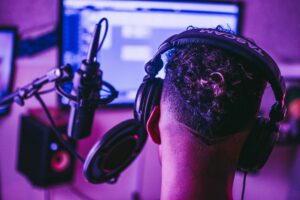Mental health in music is one of the biggest topics being talked about and rightly so – a shocking 73% of independent musicians struggle from mental health issues. How has this been neglected for so long? Not only amongst independent artists, those signed to labels are too being put under great pressure leading to compromised mental health and burnout, forcing the likes of Arlo Parks, Sam Fender and Justin Bieber to cancel tours. Arlo Parks stated: “It seems completely hypocritical of me to advocate for discussion on mental health and write songs about it if I don’t take time off to look after my own mental health.”
“It seems completely hypocritical of me to advocate for discussion on mental health and write songs about it if I don’t take time off to look after my own mental health.” – Music artist, Arlo Parks
James Smith, the singer of the band Yard Act, set for a run of European shows had to cancel them admitting: “It felt as if I was in a cattle shed. I was banging my head against the table saying: ‘I can’t do this any more’” He also stated: “Those opportunities are rare. No one owes you those slots and you can say no to them, but if you lose traction and then those opportunities don’t come along again, that’s on you.” Arlo Parks who cancelled a run of US shows explained that the relentless work the 18 months running up, had left them “exhausted and dangerously low”.
Arlo Parks left “exhausted and dangerously low”
So what are the real reasons behind these tour cancellations?
The willingness amongst artists and DJs to talk about struggles with mental health is growing along with the demands of their job against an industry that is raring to make up for ‘lost time’ through the pandemic. This is alongside the disastrous income that artists make from streaming – just to put this into context here, Spotify pay artists roughly £0.003 per stream. As an independent artist myself, this just makes me question why I even use streaming, but Spotify has 489 million users across the world, so we still continue to use it. The depths of streaming is a story for another day, but this just highlights how poorly artists are supported in the streaming world.
Ultimately, the appalling streaming income coupled with the increasing living costs and the pressure to work even more just keeps rising and rising, until breaking point, physically and mentally. Who can survive like that? The reality is no one – and sadly there’s no surprise we lose so many young people within the music industry to mental health issues when we look deeper. We must note that some labels do offer therapy for their artists, but the pressure artists feel and the increasing need for this type of support needs to shift.
What can I do if I’m experiencing mental health issues?
Music Minds Matter (MMM), the mental health service for the music industry, run with Help Musicians, has marked an increase in uptake. MMM is available to help those in need with a range of services including a 24/7 line, online resources, therapy and support sessions with peers. Joe Hastings from Help Musicians says: “After a protracted period of relative inactivity there have been heightened numbers of people coming to us about stress, anxiety and performance-related anxiety.” Whilst this pressure on music artists is ever concerning, Hastings has said there is some comfort in the fact that musicians are asking for help and discussing their concerns. “The way that artists are articulating their experiences wasn’t this common even five years ago.” He also stated that it’s “important to enable artists to make difficult decisions on the basis of having a good understanding of what they need to take care of themselves and lead happy and healthy careers.”
Touring as an independent artist
Independent artist Little Simz also cancelled her US tour due to financial unviability. “Being an independent artist, I pay for everything encompassing my live performances out of my own pocket and touring the US for a month would leave me in a huge deficit. As much as this pains me to not see you at this time, I’m just not able to put myself through that mental stress.” This just highlights how difficult it is to make money through touring and overall, as an independent artist. In 2022, The Guardian said that Universal Music Group is even making a profit from the 25% split that venues of the Academy Music Group take from merch sales within its venues, which includes O2 Academy Islington and O2 Academy Brixton for example.
Touring as an artist signed to a label
Signed artist Arooj Aftab mentioned on Twitter about the increasing difficulties around touring: increased flight prices, taxes, hotels, visas, promoters’ fear of increasing ticket prices, audience attendance post-Covid and the rising cost of living. She returned from her tour last year to find that she was still in debt by tens of thousands. “And I’m being told that it’s normal. Why is this normal? This should not be normalised.” Even still, if artists are signed to labels, there seems to be an underlying difficulty of making money through touring.
“And I’m being told that it’s normal. Why is this normal? This should not be normalised.” – Music artist, Arooj Aftab
Cassandra Jenkins, a singer songwriter, during an intense tour had to cancel two shows, realising she hadn’t had a day off for two months. “Every day, I was asking: Am I burning out? Is this how burnout feels? When you’re asking that question, you’re already past that point.” Jenkins also stated: “It’s really good to talk about this, but it’s also really hard to talk about, because it’s really hard for people to think about their favourite artists struggling to do what they do.” After announcing the cancelled dates on Instagram, Jenkins responded back to each fan. “And I received so much love back. At the end of the day, people just want to show you they care. They see that you’re vulnerable.” She hopes that this message and insight into artist vulnerability can reach the infrastructure within touring so something can change. Jenkins did go on to mention about the End of the Road festival being “the best festival i’ve ever played – because it’s just so well – organised, it allowed everyone to have a lightness about them” and this just highlights how care ultimately results in a happier artist and an improved performance.
Ian Winwood, a music journalist and the author of Bodies, a book offering an insightful look into the excesses and unhealthy demands of the music industry. He says while the industry “seems willing to have a conversation about mental health, the litmus test is whether it’s willing to challenge the notion of ‘the show must go on.’” Winwood said that there can be fear amongst artists that if they complain, those with “proper jobs” who aren’t in the industry will believe they are ungrateful. He states: “If an artist has risen to a point where people know their name, they are already tough, they’re already resilient. So if they are telling you they are broken, believe them.”
“If an artist has risen to a point where people know their name, they are already tough, they’re already resilient. So if they are telling you they are broken, believe them.” – Music journalist, Ian Winwood
What is a dream job for a lot of these artists, through the struggles of touring, they are still so appreciative of all the support they get from their fans. Arlo Parks says “I will do everything I can to make this up to you.”.
So what needs to be done?
There seems to be the constant pressure on musicians to perform and bring in the money, at the expense of their wellbeing, which is not right. With the difficulties of touring as an independent and signed artist economically, physically and mentally there seems no way out. More needs to be done within the infrastructure of touring, to make sure that it can be done in a way that will not put so much strain on musicians mentally. The reality of touring as an artist or DJ needs to be normalised and creatives must continue to speak up about how they feel and action needs to be taken so that musicians can actually tour healthily and sustainably.
With more high profile artists speaking up about their experiences, this will educate and encourage labels, managers, promotors, venues and audiences to empathise and hopefully understand the brutal health effects of making a career as a music artist, band or DJ. Furthermore, this will encourage more to speak up at all levels, promoting change now and for future generations.
If you have been struggling with topics raised in this article, the Samaritans helpline is available 24 hours a day.



